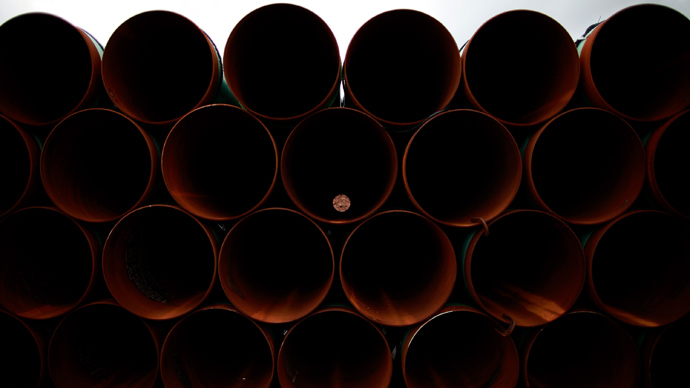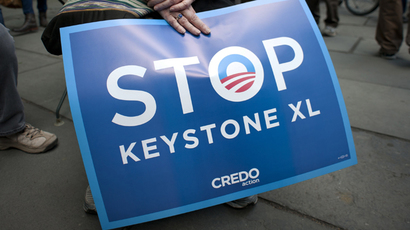Unlike Keystone XL, new tar sands pipeline gets expedited review thanks to State Dept. bypass

While the Keystone XL pipeline remains mired in controversy between oil interests and environmental advocacy groups, another tar sands pipeline that will run for hundreds of miles through the American midwest looks to be on the fast track for approval.
With space on pipelines transporting oil sands from producers to
refineries almost at capacity, Canada’s largest pipeline company
Enbridge is looking to build a new 600-mile-long line that will
carry Alberta oil sands from Flanagan, Illinois 100 miles
southwest of Chicago to a terminal in Cushing, Oklahoma and then
onto Gulf Coast refineries, reports the AP.
Enbridge, perhaps hoping to avoid the delays that have hampered
construction of Keystone XL, has sought an expedited permit
review by the US Army Corps of Engineers for the planned Flanagan
South pipeline.
Doug Hayes, a lawyer working on behalf of Sierra Club, the
environmental advocacy group, cites suspicions over Enbridge’s
strategy of seeking regulatory approval for its new pipeline
under the Nationwide 12 permit process, bypassing Clean Water Act
requirements that include public notification and environmental
reviews.
By seeking approval for a pipeline that will ultimately run for
hundreds of miles in smaller portions, the company would thus
avoid regulations that apply to large utility projects with
multiple water crossings.
"This is a 600-mile project
that will clear everything in its path for a 100-foot right of
way, and they're treating it as thousands of separate, little
projects," said Hayes.
Legally, Flanagan South differs from Keystone XL in that the new
extension will originate within US territory, thereby not
requiring the same State Department approval. Environmental
activists are apprehensive about the pipeline regardless,
pointing to the Enbridge Michigan pipeline spill that dumped
hundreds of thousands of gallons of oil into the Kalamazoo river
three years ago.
Mark DuCharme with the Michigan Department of Environmental
Quality says the massive clean up following that spill has been
tough owing to the river’s water levels at the time of the
pipeline’s eruption, which were at flood stage.
"The river flooded up out of
the banks, into the flood plain and extended out into people's
properties," DuCharme told Michigan’s WLNS.
In the hopes of reassuring homeowners and others regarding its
new pipeline, Enbridge has scheduled a number of 'open houses' in Missouri, Kansas
and Illinois in a bid to pitch the project to the public.
The Flanagan South plan has attracted little public attention so
far, with a handful of Sierra Club protesters turning up last
week at one of the town meetings in Marshall, Kansas, 90 miles
east of Kansas City.
The massive pipeline corporation has been touting the number of
short-term construction jobs to be brought in by the new project,
which also resulted in prospective pipefitters showing up at the
Marshall open house.
Still, property owners in the region slated to be impacted by
Enbridge’s new pipeline do not feel the company is being entirely
forthcoming.
Mike Diel of Macon, Missouri, tells the AP he has had no luck
getting Enbridge or the Corps of Engineers to provide specific
details about the pipeline, including a precise map or copies of
emergency response plans.
"We're all worried about oil
spills and the tar sands getting into the drinking water. Until I
know where the pipeline is going, how am I supposed to know what
I'm supposed to be worried about?" Diel said.
Under its current course the new Flanagan South pipeline would
cross both the Missouri and Mississippi rivers as well as
hundreds of smaller tributaries before reaching an existing hub
to distribute tar sands oil to refineries throughout the Gulf.
A spokeswoman with the Army Corps' Kansas City office last
Tuesday referred the AP’s inquiries on the new project's permit
status to a regulatory colleague who did not respond.














